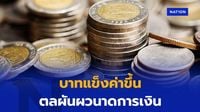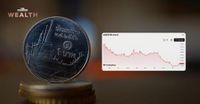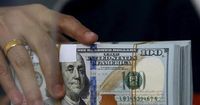The Thai baht has reached its strongest value in six months on April 17, 2025, as it appreciated to 33.12 baht per dollar from the previous closing level of 33.23 baht per dollar. Analysts are optimistic about the currency's performance, predicting it will remain in the range of 33.00 to 33.25 baht per dollar throughout the day.
According to Poon Panitpipat, a market strategist at Krungthai GLOBAL MARKETS, the baht's appreciation follows its break through the resistance level of 33.50 baht per dollar. "Since last night, the Thai baht (USDTHB) has gradually strengthened after breaking through the support zone of 33.50 baht per dollar," he stated. The currency has been buoyed by profit-taking transactions in gold as gold prices (XAUUSD) continue to rise, reaching a new all-time high.
This surge in the baht comes amid a risk-off sentiment in U.S. financial markets, driven by uncertainties surrounding U.S. trade policies and concerns about their impact on the economy. Poon noted that Federal Reserve officials have indicated that the trade policies of the Trump administration could pressure U.S. economic growth and contribute to rising inflation.
Despite these concerns, Jerome Powell, the Chair of the Federal Reserve, has emphasized that the Fed will proceed with monetary policy cautiously and will not rush to cut interest rates unless necessary. This stance contrasts with market expectations, which suggest a 63% chance of the Fed reducing rates up to four times this year.
In addition to the rising gold prices, the baht has also benefited from a slight weakening of the U.S. dollar, which has been influenced by mixed economic data. Retail sales for March increased by 1.4% month-over-month, slightly better than expected, while industrial production contracted by 0.3% month-over-month, worse than anticipated. This mixed data has left market participants uncertain about the U.S. economic outlook.
In U.S. stock markets, a continued risk-off atmosphere has resulted in significant declines, particularly in AI and semiconductor stocks. Nvidia, for example, saw a drop of 6.9% after announcing it was affected by export controls on semiconductors to China. The S&P 500 index fell by 2.24%, while the European STOXX600 index decreased by 0.19%, pressured by similar declines in AI and semiconductor stocks like ASML, which fell by 5.2%.
Looking ahead, market participants are eagerly awaiting the outcomes of the upcoming European Central Bank (ECB) meeting, where analysts expect a 25 basis point cut in the deposit facility rate to 2.25% in an effort to support the economy amidst risks from U.S. trade policies. Additionally, inflation in the Eurozone is projected to slow down.
As for the Thai baht's trajectory, it is expected to continue appreciating beyond expectations, driven primarily by profit-taking in gold transactions. Analysts suggest that the baht could test key support levels of 32.90-33.00 baht per dollar if gold prices continue to rise.
However, there are emerging signs of a potential rebound for the U.S. dollar as market players adopt a bearish outlook on the currency. This rebound could occur if economic data from the U.S. improves, along with positive earnings reports from listed companies, which would bolster confidence in holding U.S. assets.
Despite the recent strength of the baht, uncertainties surrounding U.S. trade policies remain a significant factor that could limit the dollar's rebound. The rapid appreciation of the baht, particularly in a risk-off environment, raises concerns about potential sell-offs in Asian risk assets, which could slow the baht's upward momentum.
Moreover, the recent surge in gold prices has been described as a "rapid and powerful" parabolic rise, which could lead to a correction if additional supportive factors do not emerge. Historical data indicates that after similar rapid increases, gold prices have averaged a decline of 12%.
In summary, the Thai baht's current strength can be attributed to a combination of rising gold prices, profit-taking activities, and a weakening U.S. dollar amidst uncertain economic conditions. As markets await crucial upcoming economic reports and central bank meetings, the baht's future movements will be closely monitored.






